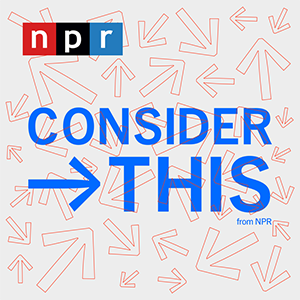 Child walking on a sidewalk holding father's hand.
Child walking on a sidewalk holding father's hand.When it comes to the cost of raising a child from infancy to the age of 17 in the United States – it's hard to settle on a precise figure.
There's one thing we do know – it's going to be expensive.
By some estimates, raising a kid, who was born in 2015, could cost a middle class family close to $320,000 over 17 years.
That money goes to childcare, healthcare, food, clothes, education, transportation, activities, toys, and a lot more. All of those things will be affected – one way or another – by the Trump administration's tariff policy.
And the companies that sell products geared at those raising kids – they're going to feel the pinch as well. One CEO argues it could even mean certain products will become unavailable.
Being a parent in the U.S. is already expensive. Slapping tariffs on the products kids use could make it more so.
This episode was produced by Brianna Scott, with audio engineering by Tiffany Vera Castro, Ted Mebane and Simon-Laslo Janssen. It was edited by Courtney Dorning. Our executive producer is Sami Yenigun.
Transcript
MARY LOUISE KELLY, HOST: When it comes to the cost of raising a child from infancy to the age of 17 in the United States, it's hard to settle on a precise figure. There's one thing we do know - it's going to be expensive. In 2017, the U.S. Department of Agriculture's Food and Nutrition Service put out a number. It estimated that a middle-income, two-parent family with two children could expect to spend close to $14,000 per year to raise one child born in 2015. Now add that up over the course of 17 years, and you are north of $233,000. Again, those figures are from 2015. Adjust for inflation, and raising a kid to adulthood could cost a middle-class family close to $320,000.
(SOUNDBITE OF MUSIC)
KELLY: That money goes to child care, health care, food, clothes, education, transportation, activities, toys and a lot more, and all of those things will be affected one way or another by the Trump administration's tariff policy. Meaning, if these tariffs stick around a while, the cost of raising a child in the U.S. just got even more expensive. And for the companies that sell products geared at raising those kids, they're going to feel the pinch as well.
STEVEN DUNN: Our whole industry has stopped ordering products from China due to the 145% tariffs.
KELLY: That is Steven Dunn, CEO of Munchkin Inc., a U.S.-based company selling juvenile and maternal products - think sippy cups, bath toys, breast pumps. So CONSIDER THIS - being a parent in the U.S. is already expensive. Slapping tariffs on the products kids use could make it more so.
(SOUNDBITE OF MUSIC)
KELLY: From NPR, I'm Mary Louise Kelly.
(SOUNDBITE OF MUSIC)
KELLY: It's CONSIDER THIS FROM NPR. Steven Dunn describes himself as a businessman and an advocate for families. Dunn's company has about 300 employees. It makes products you can find just about anywhere, and he says the tariffs are hurting both his business and families. In an open letter to President Trump and to Congress, Dunn writes that the new tariffs are forcing his company to halt orders, cut jobs and possibly run out of its products.
Briefly outline for me why tariffs pose such a threat to your company.
DUNN: Well, when the initial tariffs were implemented - the first, there was 10%, and then there was another 10% - most of the companies within the juvenile industry tried to absorb them. Now that the tariffs have increased to 145%...
KELLY: On China. Yeah.
DUNN: ...Businesses have just stopped ordering, and consumers, parents, will not find important juvenile products on the shelves soon.
KELLY: I'm just trying to get a picture in my head of what you're talking about. You're talking about products like strollers, products like baby gates. And you're saying you cannot keep making them if the current situation persists?
DUNN: Sixty percent of freight containers or shippers have been canceled. Our whole industry has stopped ordering products from China due to the 145% tariffs. These are tariffs that just can't be passed on to parents. Parents are - birth rates are at the lowest levels in the last 40 years, and making it more difficult and more expensive to be parents is going to even exasperate (ph) that issue now.
KELLY: Yeah. Stay with that point for a second, because in this open letter, you write, and I'm quoting, "if action is not taken soon, the damage will be irreversible not only for our company, our employees, but countless businesses, workers and families across America." What is the damage you see being done to American families?
DUNN: The products they rely on. Munchkin operates in about 12 different categories - things from bottle brushes to bottles to a new product we launched that helps moms meet their breastfeeding goals. These products will not be on the shelves because our industry and millions of small businesses have simply stopped ordering. We'll run out of inventory in the next 60 days.
KELLY: Sixty days? Six-zero?
DUNN: Six-zero. And if we don't place orders now, an order we place now will take 45 days to get here. So we're at a critical path where Munchkin owns thousands of tools in China. I can't even move my tools to the U.S. I can't get an export license to move used tools. So moving and trying to relocate businesses like the juvenile industry or the maternal health industry into the U.S. takes years and years. It would take government-supported programs to create manufacturing zones. Just to manufacture our sippy cups would take a hundred molding machines in the U.S. - if we could find them.
KELLY: If President Trump were on the line with us now, he might be arguing, hey, tariffs are going to bring manufacturing back to the United States. This is good for America. This is good for American workers. What do you say to that?
DUNN: Well, I would say I wholeheartedly support the intent of onshoring strategic industries like semiconductors, pharmaceuticals and aerospace. But with respect to the juvenile industry and products that parents need every day, our industry is not made up of Apples. We don't have a hundred billion dollars sitting in the bank. We have no ability, and there is not this manufacturing base that is suddenly going to appear in the U.S. that can mold over a hundred - you know, thousands and thousands of low-margin products. We don't have the automation, we don't have the skilled labor. So our industry is going to have layoffs. Our company has had a hiring freeze. We're not innovating. We can't find countries that don't have tariffs right now that make these products affordable for the American public.
KELLY: You founded Munchkin in 1991?
DUNN: Thirty-three, 34 years ago, yes.
KELLY: Yeah. For someone listening to us skeptically, who might wonder, hey, is this guy really worried about American families, is he really worried about his workers, or is he worried about his company's bottom line? What would you say?
DUNN: Well, I would say for 34 years we've made really safe and innovative products. Our goal has always been to support parents. Am I worried about our 300 loyal, incredible employees? Absolutely. But I am speaking on behalf of all the other small and medium-sized businesses in the same country. We've done everything right. We've innovated. We've brought in wonderful, safe products. And it's impossible to bring this on shore in the time frame that the - and without the government's support by setting up infrastructure.
KELLY: Are you in conversation with other small-, medium-sized business owners about a path forward?
DUNN: We're part of the Juvenile Products Manufacturing (ph) Association. I've talked with their general counsel. They're also petitioning the administration to look at an exemption or a carve-out for the juvenile industry due to the importance of supporting parents. What I've - in talking with other CEO and leaders, everyone that I've talked to has stopped - 100% - their orders coming in from China. At 145%, products will just be too expensive, and the consumers will not be able to pay for them.
KELLY: Have you heard back from anyone in government?
DUNN: I have not. We FedExed, we've emailed. And I know the administration is working on very strategic negotiations with other countries, but the small business leaders, small businesses throughout the U.S., you know, we're on a ticking time bomb. Everyone has stopped ordering, and we're going to run out of inventory. There will be layoffs within our industry, and there'll be companies that will go out of business.
(SOUNDBITE OF MUSIC)
KELLY: That was Steven Dunn, founder and CEO of Munchkin.
(SOUNDBITE OF MUSIC)
KELLY: This episode was produced by Brianna Scott, with audio engineering by Tiffany Vera Castro, Ted Mebane and Simon-Laslo Janssen. It was edited by Courtney Dorning and Eric McDaniel. Our executive producer is Sami Yenigun.
(SOUNDBITE OF MUSIC)
KELLY: It's CONSIDER THIS FROM NPR. I'm Mary Louise Kelly.
Accuracy and availability of NPR transcripts may vary. Transcript text may be revised to correct errors or match updates to audio. Audio on npr.org may be edited after its original broadcast or publication. The authoritative record of NPR’s programming is the audio record.
 NPR NEWS
NPR NEWS

By submitting your comments, you hereby give AZPM the right to post your comments and potentially use them in any other form of media operated by this institution.